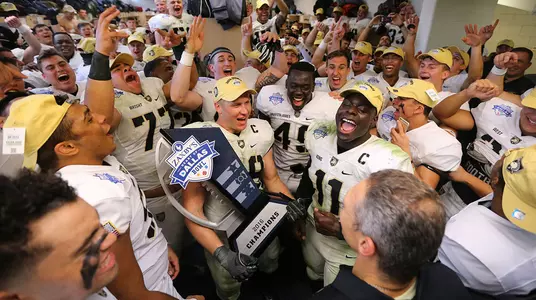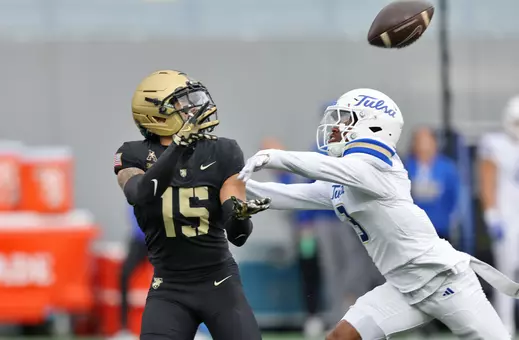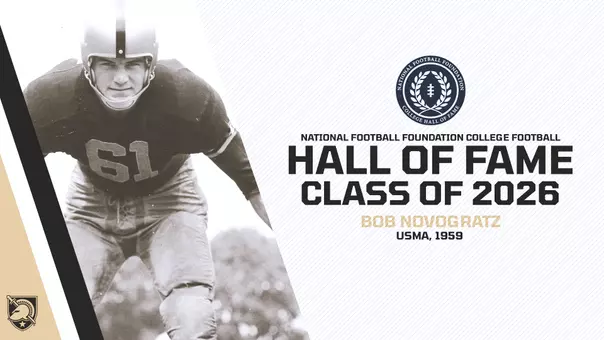Army West Point Athletics

Feinstein's Findings: Happy Days Are Here Again
December 28, 2016 | Football
In Tom Cahill's first two seasons as Army's football coach, the Cadets went 8-2 and 8-2, the second of those teams being the famous non-Sugar Bowl team of 1967.
Seventeen years later, a Jim Young coached team went 8-3-1 and won the first bowl game Army ever played in—The Cherry Bowl--the Cadets beating Michigan State, 10-6.
A year later, Army went 9-3, culminating that season with a stunning 31-29 upset of Illinois in The Peach Bowl. Watching that game on television, a former Army basketball coach named Bob Knight watched the Cadets stop a two-point conversion attempt by the Illini in the waning seconds to clinch the victory.
Knight stood up, looked at his assembled coaches and said, "Well, maybe there is a God." Knight always loved West Point. Illinois, not so much.
Then, in 1988, what might have been Young's best team lost to Alabama, 29-28, in the Sun Bowl, again finishing 9-3. And finally, in 1996, Bob Sutton became the first and only coach to win 10 games in a season at Army, going 10-2. The Black Knights won the Commander-in-Chief's Trophy that year before losing a riveting Independence Bowl, 32-29 to Auburn.
Those seven seasons—dating to Red Blaik's retirement in 1958—58 football falls if you are counting at home—were the only years in which Army had won eight games.
Until Wednesday. Now, it has eight seasons with at least eight wins since Blaik's last team went 8-0-1. Oh sure, old timers will correctly point out that Blaik's teams never played more than nine games in a season and Jeff Monken's 2016 team needed 13 outings to win 8 games.
They might also add that the North Texas Mean Green ain't the Alabama Crimson Tide, the Auburn Tigers, the Illini of Illinois or the Spartans of Michigan State.
Doesn't matter. Not even a little bit. This Army team is now, without a doubt, one that will be remembered around The Plain forever. The players will come back for 10-year reunions from here-to-eternity because everyone who follows Army football knows that what they accomplished was nothing short of extraordinary.
Since the ill-fated decision to join Conference USA in 1998, Army had as many winning seasons (1) as winless seasons (1) when they began this campaign at Temple. Since that one winning record—Rich Ellerson's 2010 team that went 7-6—Army hadn't won more than four games in a season. It was 2-10 a year ago, many of the losses caused by self-destructing turnovers and penalties.
It is also worth remembering that Army had last beaten Navy in 2001—14 straight losses, many of them one-sided.
So what did this group of Black Knights accomplish? First—foremost—the 21-17 win over Navy. Second, road wins over a 10-win Temple team and a 7-win Wake Forest team. Third, the bowl victory. Fourth, those eight wins. Fifth, a positive vibe going into the offseason that has been as rare at Army in the last 20 years as a 70-degree afternoon at West Point in January.
Of course winning the Heart of Dallas Bowl wasn't easy. Perhaps it SHOULD have been easy. Army had 533 yards in total offense, rushing for an astounding 480 yards. It led 24-7 in the second quarter and should have led 28-7. It led until the final seconds of regulation and still had to play overtime.
But maybe that was the right ending for this team. Because in overtime when it was—as coaches like to say—gut-check time, the Black Knights were the team that had the guts to pull off a 38-31 win.
It started with Monken deciding to go for it on fourth down from the three-yard-line on the opening possession of the extra period. Let's be honest, desperation played a role in that decision. Every Army placekick this season, dating to the season-opener at Temple, has been an adventure. Blake Wilson had missed the extra point after Army's opening touchdown of the game. Monken had decided to go for two on the next three touchdowns and all had failed.
That's why what should have been a 28-7 lead in the second quarter was only 24-7. That's why the game was in overtime even though Army had scored five touchdowns and North Texas had scored four and a field goal.
An overtime field goal would have been from extra point distance.
Which meant it was iffy.
Monken decided he liked his offensive line's chances of making a play better. He also liked the notion of forcing North Texas to score a touchdown to keep the game going.
So, the offense came back onto the field on fourth down. Jordan Asberry took a pitch from quarterback Ahmad Bradshaw—brilliant all day with 129 yards rushing—and scored. With everyone holding their breath, Wilson converted the extra point to make it 38-31 and it was up to the defense.
Which was as it should be. For all the (accurate) talk about the improved play of the offense--Wednesday's only turnover was a muffed punt—the defense was the heart-and-soul of this team most of the season.
And yet, other than Notre Dame, North Texas gave Jay Bateman's unit more trouble than anyone. In the October loss in Michie Stadium, the seven turnovers yielded by the offense finally wore the defense down in the second half. Wednesday, the Mean Green moved the football well most of the day, rallying from the early deficit. They got a gift touchdown on Malik McGue's muffed punt, but were able to pick up 410 yard in total offense—most of it through the air.
But with the season on the line, the defense said, 'enough.' On 2nd-and-6, Jeremy Timpf, who was all over the field the entire day, tackled running back Jeffrey Wilson for a 3-yard-loss at the 24-yard-line. The last tackle of Timpf's remarkable career—he had 12 solo and 15 total for the day—was as important as any in his time at West Point.
Faced with third-and-nine, the Mean Green had to throw and the Black Knights were ready. On fourth down, quarterback Alec Morris, who had been excellent all day, tried to find receiver Thaddeus Thompson. But Rhyan England was there to break it up.
Let the celebration begin.
There should be plenty of brightness even during the upcoming gray days at West Point. Army football turned a major corner this season and there's good reason to believe the future is bright.
Only six seniors—three on each side of the ball—started on Wednesday. The defense will lose three key contributors in Timpf, Andrew King and Xavier Moss. But the recruiting done by the coaching staff the last three years is clearly kicking in and there are talented underclassmen returning, not to mention those who will come over from the prep school.
Last spring, the emphasis was on two major weaknesses: fumbles and penalties. The improvement in those two areas was a key factor in going from three wins to eight wins, including the wins over Navy and in the bowl game.
This spring, the special teams MUST improve. To call the placekicking and the punting inconsistent this fall is about as kind a way to describe them as is possible. A missed extra point; the inability to convert a field goal can cost a close game. It happened at Buffalo, it could have happened Wednesday in Dallas.
Of course Monken knows all this. He will probably take a deep breath for about 15 minutes before diving into recruiting and beginning preparation for Fordham—which is now only 247 days away.
Two seasons ago, the Rams came into Michie Stadium on opening night and beat the Black Knights. Don't expect a repeat next September. Those days—losing to FCS teams—should now be be in Army's rear view mirror.
Happy days are here again.
Finally.
Seventeen years later, a Jim Young coached team went 8-3-1 and won the first bowl game Army ever played in—The Cherry Bowl--the Cadets beating Michigan State, 10-6.
A year later, Army went 9-3, culminating that season with a stunning 31-29 upset of Illinois in The Peach Bowl. Watching that game on television, a former Army basketball coach named Bob Knight watched the Cadets stop a two-point conversion attempt by the Illini in the waning seconds to clinch the victory.
Knight stood up, looked at his assembled coaches and said, "Well, maybe there is a God." Knight always loved West Point. Illinois, not so much.
Then, in 1988, what might have been Young's best team lost to Alabama, 29-28, in the Sun Bowl, again finishing 9-3. And finally, in 1996, Bob Sutton became the first and only coach to win 10 games in a season at Army, going 10-2. The Black Knights won the Commander-in-Chief's Trophy that year before losing a riveting Independence Bowl, 32-29 to Auburn.
Those seven seasons—dating to Red Blaik's retirement in 1958—58 football falls if you are counting at home—were the only years in which Army had won eight games.
Until Wednesday. Now, it has eight seasons with at least eight wins since Blaik's last team went 8-0-1. Oh sure, old timers will correctly point out that Blaik's teams never played more than nine games in a season and Jeff Monken's 2016 team needed 13 outings to win 8 games.
They might also add that the North Texas Mean Green ain't the Alabama Crimson Tide, the Auburn Tigers, the Illini of Illinois or the Spartans of Michigan State.
Doesn't matter. Not even a little bit. This Army team is now, without a doubt, one that will be remembered around The Plain forever. The players will come back for 10-year reunions from here-to-eternity because everyone who follows Army football knows that what they accomplished was nothing short of extraordinary.
Since the ill-fated decision to join Conference USA in 1998, Army had as many winning seasons (1) as winless seasons (1) when they began this campaign at Temple. Since that one winning record—Rich Ellerson's 2010 team that went 7-6—Army hadn't won more than four games in a season. It was 2-10 a year ago, many of the losses caused by self-destructing turnovers and penalties.
It is also worth remembering that Army had last beaten Navy in 2001—14 straight losses, many of them one-sided.
So what did this group of Black Knights accomplish? First—foremost—the 21-17 win over Navy. Second, road wins over a 10-win Temple team and a 7-win Wake Forest team. Third, the bowl victory. Fourth, those eight wins. Fifth, a positive vibe going into the offseason that has been as rare at Army in the last 20 years as a 70-degree afternoon at West Point in January.
Of course winning the Heart of Dallas Bowl wasn't easy. Perhaps it SHOULD have been easy. Army had 533 yards in total offense, rushing for an astounding 480 yards. It led 24-7 in the second quarter and should have led 28-7. It led until the final seconds of regulation and still had to play overtime.
But maybe that was the right ending for this team. Because in overtime when it was—as coaches like to say—gut-check time, the Black Knights were the team that had the guts to pull off a 38-31 win.
It started with Monken deciding to go for it on fourth down from the three-yard-line on the opening possession of the extra period. Let's be honest, desperation played a role in that decision. Every Army placekick this season, dating to the season-opener at Temple, has been an adventure. Blake Wilson had missed the extra point after Army's opening touchdown of the game. Monken had decided to go for two on the next three touchdowns and all had failed.
That's why what should have been a 28-7 lead in the second quarter was only 24-7. That's why the game was in overtime even though Army had scored five touchdowns and North Texas had scored four and a field goal.
An overtime field goal would have been from extra point distance.
Which meant it was iffy.
Monken decided he liked his offensive line's chances of making a play better. He also liked the notion of forcing North Texas to score a touchdown to keep the game going.
So, the offense came back onto the field on fourth down. Jordan Asberry took a pitch from quarterback Ahmad Bradshaw—brilliant all day with 129 yards rushing—and scored. With everyone holding their breath, Wilson converted the extra point to make it 38-31 and it was up to the defense.
Which was as it should be. For all the (accurate) talk about the improved play of the offense--Wednesday's only turnover was a muffed punt—the defense was the heart-and-soul of this team most of the season.
And yet, other than Notre Dame, North Texas gave Jay Bateman's unit more trouble than anyone. In the October loss in Michie Stadium, the seven turnovers yielded by the offense finally wore the defense down in the second half. Wednesday, the Mean Green moved the football well most of the day, rallying from the early deficit. They got a gift touchdown on Malik McGue's muffed punt, but were able to pick up 410 yard in total offense—most of it through the air.
But with the season on the line, the defense said, 'enough.' On 2nd-and-6, Jeremy Timpf, who was all over the field the entire day, tackled running back Jeffrey Wilson for a 3-yard-loss at the 24-yard-line. The last tackle of Timpf's remarkable career—he had 12 solo and 15 total for the day—was as important as any in his time at West Point.
Faced with third-and-nine, the Mean Green had to throw and the Black Knights were ready. On fourth down, quarterback Alec Morris, who had been excellent all day, tried to find receiver Thaddeus Thompson. But Rhyan England was there to break it up.
Let the celebration begin.
There should be plenty of brightness even during the upcoming gray days at West Point. Army football turned a major corner this season and there's good reason to believe the future is bright.
Only six seniors—three on each side of the ball—started on Wednesday. The defense will lose three key contributors in Timpf, Andrew King and Xavier Moss. But the recruiting done by the coaching staff the last three years is clearly kicking in and there are talented underclassmen returning, not to mention those who will come over from the prep school.
Last spring, the emphasis was on two major weaknesses: fumbles and penalties. The improvement in those two areas was a key factor in going from three wins to eight wins, including the wins over Navy and in the bowl game.
This spring, the special teams MUST improve. To call the placekicking and the punting inconsistent this fall is about as kind a way to describe them as is possible. A missed extra point; the inability to convert a field goal can cost a close game. It happened at Buffalo, it could have happened Wednesday in Dallas.
Of course Monken knows all this. He will probably take a deep breath for about 15 minutes before diving into recruiting and beginning preparation for Fordham—which is now only 247 days away.
Two seasons ago, the Rams came into Michie Stadium on opening night and beat the Black Knights. Don't expect a repeat next September. Those days—losing to FCS teams—should now be be in Army's rear view mirror.
Happy days are here again.
Finally.
Players Mentioned
Army vs. Bucknell Women's Basketball Game Highlights
Thursday, January 22
2026 West Point Open (Army Spotlight)
Saturday, January 17
Army Women's Basketball Ericson Feature
Friday, January 02
Wasabi Fenway Bowl Game Highlights
Saturday, December 27












